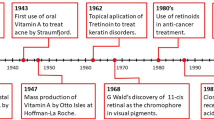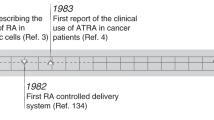Abstract
VITAMIN A (retinol) is a nutrient essential for vision, growth, reproduction and proper differentiation of epithelial tissue1. Some retinol is oxidised to retinoic acid (vitamin A acid) in vivo2, but if an animal is provided with retinoic acid in place of dietary retinol, it can only partially substitute for the missing retinol; vision3 and reproduction are impaired4. Sporn et al.5 have described two systems for evaluating the activity of retinol, retinoic acid, and their analogues in vitro. One measures the ability of such compounds to promote growth by determining RNA, DNA and protein levels after addition of the test compound to epidermal cell cultures derived from newborn mouse skin; the other measures ability to reverse metaplasia of the epithelial cells of trachea explanted to organ culture from vitamin A-deficient hamsters. Retinoic acid is active in both systems.
This is a preview of subscription content, access via your institution
Access options
Subscribe to this journal
Receive 51 print issues and online access
$199.00 per year
only $3.90 per issue
Buy this article
- Purchase on Springer Link
- Instant access to full article PDF
Prices may be subject to local taxes which are calculated during checkout
Similar content being viewed by others
References
Moore, T., in The vitamins, 1 (edit. by Sebrell, W. H., and Harris, R. S.), 245–266 (Academic, New York, 1972).
Emerick, R. J., Zile, M., and DeLuca, H. F., Biochem. J., 102, 606–611 (1967).
Dowling, J. E., and Wald, G., Proc. natn. Acad. Sci. U.S.A., 46, 587–608 (1960).
Thompson, J. N., Howell, J. McC., and Pitt, G. A., Proc. R. Soc., B 159, 510–535 (1964).
Sporn, M. B., et al., Nature, 253, 47–50 (1975).
Bollag, W., Eur. J. Cancer, 10, 731–737 (1974).
Bashor, M. M., Toft, D. O., and Chytil, F., Proc. natn. Acad. Sci. U.S.A., 70, 3483–3487 (1973).
Ong, D. E., and Chytil, F., J. biol. Chem., 250, 6113–6117 (1975).
Ong, D. E., and Chytil, F., Nature, 255, 74–75 (1975).
Chytil, F., Page, D. L., and Ong, D. E., Int. J. Nutr. Res., 45, 293–299 (1975).
Ong, D. E., Page, D. L., and Chytil, F., Science, 190, 60–61 (1975).
Sani, B. P., and Hill, D. L., Biochem. biophys. Res. Commun., 61, 1276–1282 (1974).
Lasnitzki, I., and Goodman, D. S., Cancer Res., 34, 1564–1571 (1974).
Bollag, W., Chemotherapy, 21, 236–247 (1975).
Author information
Authors and Affiliations
Rights and permissions
About this article
Cite this article
CHYTIL, F., ONG, D. Mediation of retinoic acid-induced growth and anti-tumour activity. Nature 260, 49–51 (1976). https://doi.org/10.1038/260049a0
Received:
Accepted:
Issue Date:
DOI: https://doi.org/10.1038/260049a0
This article is cited by
-
Evaluation of retinoids as inhibitors of [3H] all-trans retinoic acid binding to cellular retinoic acid-binding protein in rat skin and testes
Archives of Dermatological Research (1986)
-
Cellular retinoic acid-binding protein and its relationship to the biological activity of four synthetic retinoids in hamster tracheal organ culture
In Vitro Cellular & Developmental Biology (1986)
-
Calmodulin antagonists inhibit retinoic acid-induced cartilage degradation in vitro
Wilhelm Roux's Archives of Developmental Biology (1985)
-
Co-carcinogenic effects of several Korean foods on gastric cancer induced by N-methyl-N′-nitro-N-nitrosoguanidine in rats
The Japanese Journal of Surgery (1985)
-
Reversible suppression by ionophore A23187 of retinoic acid-induced cartilage resorption in cultured fetal rat bones
Wilhelm Roux's Archives of Developmental Biology (1984)
Comments
By submitting a comment you agree to abide by our Terms and Community Guidelines. If you find something abusive or that does not comply with our terms or guidelines please flag it as inappropriate.



